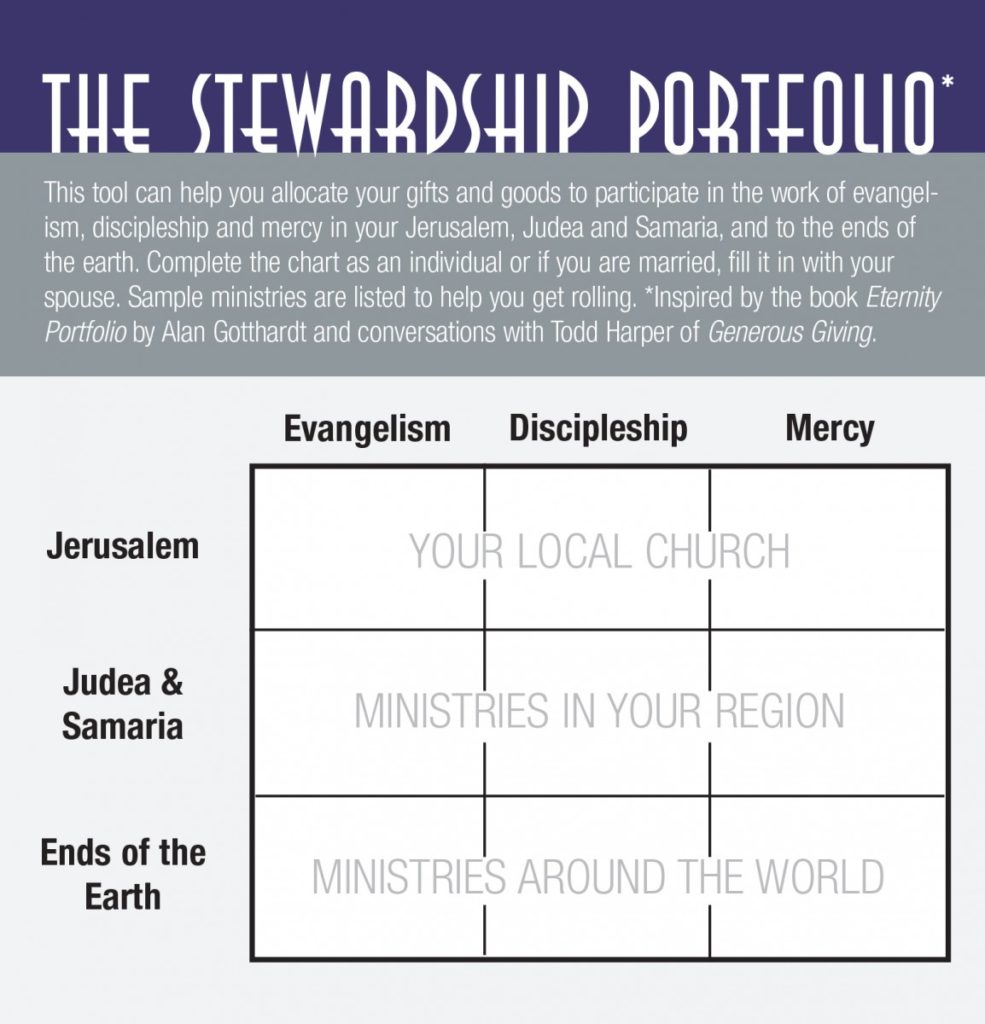May 18, 2015
Throughout most of the last decade, it has been a privilege for us to co-labor in God’s kingdom work as friends and fellow stewards. We are better together because our gifts complement each other!
Last week, we looked at 1 Peter 4:10 and the text challenged us to consider how we steward the spiritual gifts we have been given. Stewardship is about what we have. Each of us has spiritual gifts to employ for the common good and material goods that have been entrusted to us for enjoyment and sharing.
This week, we want to direct your attention more closely to the connection between spiritual formation and stewardship. Because our walk with Christ is connected to everything we do, everything we are, and everything we have been given, growth in stewardship is a vital aspect of our spiritual formation. At the end of this article, we will share a tool called the Stewardship Portfolio. We hope it helps you more intentionally deploy yourself and your resources as you participate with us in God’s kingdom work.
Practicing stewardship is a vital aspect of spiritual formation. By stewardship, we are referring to much more than just our giving. Part of our growth as followers of Jesus is learning our role and carrying out our responsibilities as stewards in his kingdom. We believe we are stewards entrusted with spiritual gifts and material goods for the purpose of glorifying God, serving others and making known the eternal gospel!
Consider these five tips and a practical tool to help you on your journey.
(1) Discern your gifts.
In 2 Timothy 1:6, Paul challenged Timothy to “fan into flame” the gift God had given him. How has God gifted you? If you are not sure, take a spiritual gifts test. Such instruments help us discern how God has wired us to participate in his work. Share your results with a spouse or close friend who can give you feedback on what you have learned.
(2) Assess your activities.
Carve out some time for solitude with the Lord regarding your giftedness. Are your gifts smoldering or stoked? Paul reminds us that the gifts of the Spirit are given for “the common good” in 1 Corinthians 12:7. How are you employing your gifts to edify the body of Christ? Often a mentor can help you identify areas for potential growth and hold you accountable to use your gifts.
(3) Take inventory of your goods!
Most people don’t realize how much stuff they have until they list it. Don’t just include your bank account(s), put down your house(s), your car(s) and any other assets you may have. You don’t need an accountant for this exercise but you may need a few sheets of paper. Now take a moment to give thanks for the things that God has provided for you to enjoy and share (1 Timothy 6:17-19).
(4) Fast and pray about how your stuff may have a hold on you.
In Luke 16:13b, Jesus said plainly, “You cannot serve God and mammon.” Jesus knew that for many people, their possessions possessed them. In what way may this be true for you? Fasting and prayer can serve as a refreshing retreat from our materialistic society and help you evaluate your relationship with your stuff from a kingdom perspective.
(5) Intentionally allocate the resources in your stewardship!
To ensure you are found faithful in your stewardship (1 Corinthians 4:2), consider using the Stewardship Portfolio below to map out a plan for investing for eternal returns. Rather than merely exhorting you to serve with your gifts and tithe from your goods, this tool helps you strategically offer yourself to God as a living sacrifice (Romans 12:1-2), amounting to far more than giving a percentage of your time and money.
Practicing Stewardship
We have come to the conclusion that if we ever think we have “arrived” when it comes to our stewardship, we may at that moment be like the steward scorned for burying his talents (cf. Luke 19 or Matthew 25). Stewardship is a process, not a destination. As you journey through that process, we invite you to reflect on the tips we have outlined here and consider what you might put in each of the areas within the Stewardship Portfolio.
